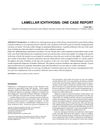
Scarring alopecia, a type of hair loss, is most common in females under 35, often caused by discoid lupus erythematosus and pseudopelade of Brocq. Skin punch biopsy and histopathology are key to identifying its cause.
 March 2019 in “Journal of Investigative Dermatology”
March 2019 in “Journal of Investigative Dermatology” Seborrheic dermatitis is influenced by diet, genetics, and psychological factors.
 August 2009 in “Expert Review of Dermatology”
August 2009 in “Expert Review of Dermatology” Pregnancy can cause skin changes and conditions that need correct diagnosis and treatment for the health of the mother and baby.

Botulinum toxin type A significantly reduces scalp psoriasis severity compared to placebo.
 14 citations,
September 2016 in “Journal of Cutaneous Pathology”
14 citations,
September 2016 in “Journal of Cutaneous Pathology” The document concludes that new methods improve the accuracy of diagnosing scalp alopecia and challenges the old way of classifying it.
 41 citations,
October 2017 in “International Journal of Women's Dermatology”
41 citations,
October 2017 in “International Journal of Women's Dermatology” Most pregnant women experience skin darkening and hair changes, with these effects usually going away after giving birth.
 7 citations,
December 2011 in “Elsevier eBooks”
7 citations,
December 2011 in “Elsevier eBooks” The document concludes that early diagnosis and treatment are crucial for managing skin diseases in ferrets.
 9 citations,
July 2018 in “European Journal of Dermatology”
9 citations,
July 2018 in “European Journal of Dermatology” Brodalumab effectively treated a man's severe hand and foot psoriasis.
 February 2024 in “PloS one”
February 2024 in “PloS one” Tofacitinib and adalimumab are promising treatments for cicatricial alopecia with few side effects.
 January 1998 in “Lasers in Surgery and Medicine”
January 1998 in “Lasers in Surgery and Medicine” Lasers are effective and safe for various medical treatments, including cancer, wound healing, and skin conditions.
 11 citations,
October 2015 in “Journal der Deutschen Dermatologischen Gesellschaft”
11 citations,
October 2015 in “Journal der Deutschen Dermatologischen Gesellschaft” Women who had bariatric surgery risk nutritional deficiencies causing skin issues during pregnancy and breastfeeding.

A girl with Crohn's disease developed hair loss due to her increased medication, a rare side effect seen in some children.
29 citations,
June 2020 in “International Journal of Molecular Sciences” Notch signaling disruptions can cause various skin diseases.
 16 citations,
October 2020 in “Lipids in Health and Disease”
16 citations,
October 2020 in “Lipids in Health and Disease” Leptin affects skin and hair health and may worsen some skin conditions, but more research is needed to understand its full impact.
82 citations,
May 2010 in “PLoS neglected tropical diseases” Secondary syphilis in Cali, Colombia, shows high Treponema pallidum presence and challenges in early diagnosis, needing better public health strategies.
 1 citations,
October 2018 in “InTech eBooks”
1 citations,
October 2018 in “InTech eBooks” The document concludes that treatments for cicatricial alopecia are not well-supported by evidence, but hair transplantation shows more predictable and satisfactory results.
1 citations,
January 2023 in “International journal of molecular sciences” Rabbits with Sarcoptes scabiei had thicker skin, cell death, and skin hardening.
 42 citations,
April 2012 in “Seminars in Oncology”
42 citations,
April 2012 in “Seminars in Oncology” Targeted cancer therapies often cause skin problems that need careful management to improve patient quality of life and treatment success.
 4 citations,
November 2011 in “Archives of Dermatology”
4 citations,
November 2011 in “Archives of Dermatology” Hamilton scale imprecise, hair shaft diameter decreases, stem cell transplant regrows hair, ECP ineffective for alopecia areata universalis.
179 citations,
June 2000 in “The American journal of pathology” The absence of functional sebaceous glands causes hair follicle destruction and scarring alopecia.

Bovines can have rare inherited skin diseases with specific symptoms like hair loss, fragile skin, and abnormal porphyrin buildup.
 17 citations,
September 2010 in “Pediatric dermatology”
17 citations,
September 2010 in “Pediatric dermatology” A 15-year-old with KID syndrome developed a rare skin condition called PEHFN.
 33 citations,
April 2002 in “Journal of Cutaneous Medicine and Surgery”
33 citations,
April 2002 in “Journal of Cutaneous Medicine and Surgery” Eating disorders can cause skin problems that need treating the underlying condition for better health.
 August 2023 in “Dermatology and Therapy”
August 2023 in “Dermatology and Therapy” Imiquimod can cause rare skin side effects, some irreversible, and long-term follow-up is important for users.
 December 2022 in “Journal of medical sciences and health”
December 2022 in “Journal of medical sciences and health” Examining nail biopsies is useful for diagnosing nail diseases.
 1 citations,
October 2014
1 citations,
October 2014 The document concludes that diagnosing and managing plaque psoriasis, particularly in sensitive areas, is challenging and requires careful differentiation from similar skin conditions.
 88 citations,
July 2014 in “Journal of the American Academy of Dermatology”
88 citations,
July 2014 in “Journal of the American Academy of Dermatology” Targeted cancer therapies often cause skin reactions, so dermatologists must manage these effects.
 1 citations,
January 2019 in “International Journal of Medical Reviews and Case Reports”
1 citations,
January 2019 in “International Journal of Medical Reviews and Case Reports” Treatment with moisturizers improved the skin condition of a girl with a rare genetic skin disorder.
 17 citations,
February 2015 in “Cell Death and Disease”
17 citations,
February 2015 in “Cell Death and Disease” Inhibiting AP1 in mice skin causes structural changes and weakens the skin barrier.
 August 2021 in “Acta Haematologica Polonica”
August 2021 in “Acta Haematologica Polonica” Folliculotropic mycosis fungoides has a worse prognosis than other types, with survival rates varying significantly based on subtype and organ involvement.

























